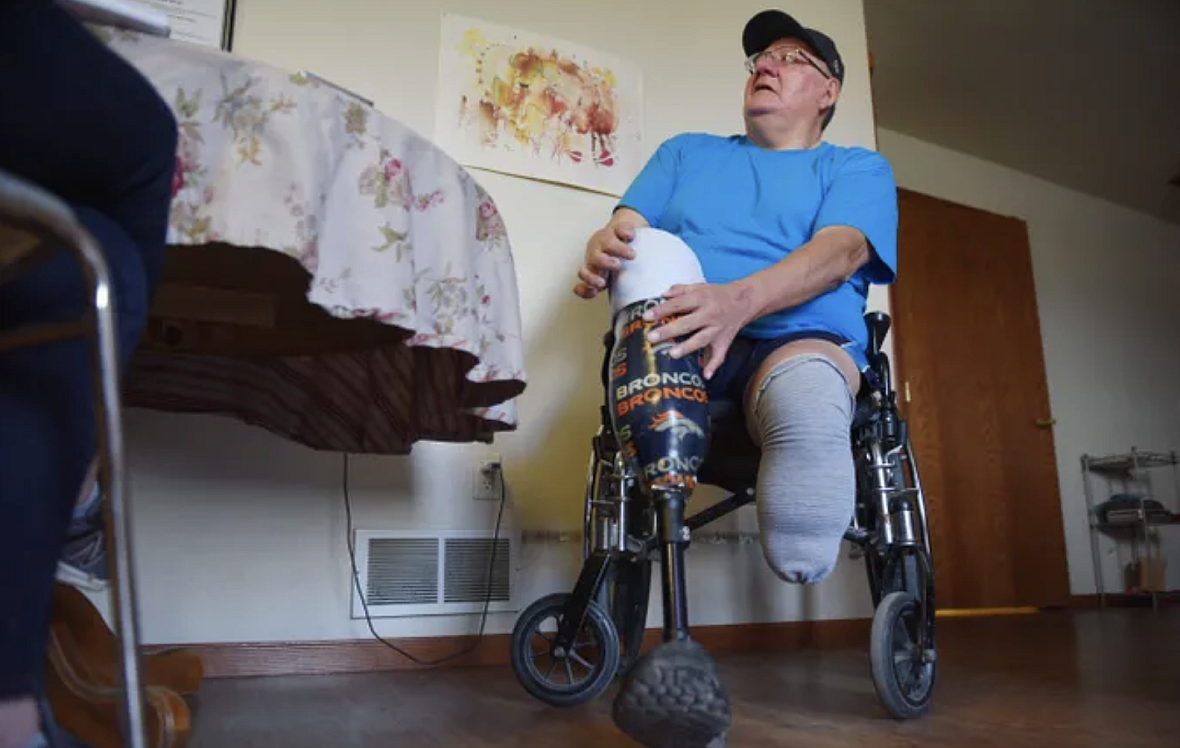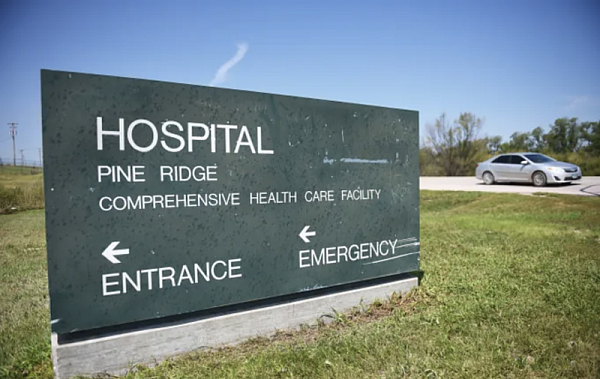Violated: Negligent care costs patients time, money and limbs at Indian Health Service hospitals
This story was produced as part of a larger project led by Dana Ferguson, a participant in the 2018 National Fellowship.
Other stories in this series include:
House committee demands answers from IHS, cites Argus Leader reporting
Violated: Inside South Dakota's Native American health care crisis
Violated: How the Indian Health Service betrays patient trust and treaties in the Great Plains

Lino Spotted Elk showed a torn prosthetic sleeve Tuesday, Sept. 18, at his home in Rosebud.
Photo: Briana Sanchez / Argus Leader
Misdiagnoses cost patients their limbs. Patients would rather stay home than risk getting care at Indian Health Service hospitals. And for those willing to take the gamble, medical bills pile up despite a promise from the federal government to foot the bill for their care.
For Native Americans who access care at a pair of IHS hospitals in South Dakota, these are realities.
The Argus Leader reviewed hundreds of pages of federal hospital inspection records and legal filings as part of a monthslong investigation into the facilities. And reporters met with dozens of tribal members on visits to the Rosebud and Pine Ridge Indian Reservations.
Combined, the accounts reveal the hospitals' failure to meaningfully improve deplorable conditions despite repeated warnings from federal watchdogs.
And patients have paid the price.
Here are the stories of four patients who shared their experiences with the Argus Leader.
Lino Spotted Elk
Lino Spotted Elk needs a new prosthetic leg.
In a dream world, the double amputee would get two.
His prosthesis loosened in the years since his right leg was amputated. And the sleeve he wears to keep the device in place shredded from extensive use.
Now, bruises cover the skin below his knee. And site often becomes tender, making it more painful for him to walk around his neighborhood or get to work.
Spotted Elk has become accustomed to walking, driving and living with just one prosthesis.
And a new leg would change everything, he said.
But Spotted Elk knows it could come at a cost.
The former tribal paramedic and Rosebud Sioux tribal health board member has been fighting terminal diagnoses of bone and blood cancer. Along the way, he lost the lower part of his legs to the diseases.
Now, he's on the cusp of losing his house to a backlog of medical bills.
To Spotted Elk, a new prosthesis is critical, but IHS doesn’t view it that way. The federal hospital system will only cover expenses from hospitals outside IHS if the patient is at risk of "losing life or limb."
Spotted Elk didn't have the option to receive a prosthesis from the Rosebud IHS hospital, so he had to go outside the hospital system to get one.
And because Spotted Elk isn’t currently at risk of losing life or limb, IHS won’t pay his bill, he said.
Instead, he'll pay for the $10,000 prosthetic leg out-of-pocket.
He's tried to pay a little at a time over the last several months, but it's meant putting off other expenses.
“If I don’t have this leg, I don’t know how I’m going to get out of bed," Spotted Elk said. "I don’t know how I’m going to get over to sit in the bathroom. Just things like that, I’m probably going to end up having to go into a nursing home.”
Spotted Elk has long been a health advocate for his tribe, devoting his life to help people obtain care. But now he's seeing firsthand just how difficult that can be.
Initially, IHS doctors misdiagnosed the sore on his foot as a symptom of diabetes. They treated him accordingly, and, when that didn't work, an oncologist tested the foot for cancer.
Spotted Elk had bone cancer that likely stemmed from exposure to toxic radiation at the Fort McClellan Army base in Alabama.
And by the time IHS doctors determined that and diagnosed him with cancer, it was too late.
Doctors amputated his right leg and, two years later, his left. They later discovered he had bone cancer in his collarbone and forearm. Surgeons excised pieces of the bone at a Rapid City hospital and asked that Spotted Elk return for follow-up visits.
Those appointments and physical therapy weren’t covered by IHS, so Spotted Elk had to foot the bill for the medical appointments or skip them. He did physical therapy on his own.
“Fortunately, I didn’t die of cancer in spite of IHS’ lack of care,” Spotted Elk said.
Nicol Burow
Nicol Burow didn't see the water on the floor when she slipped while washing dishes.
But she felt the splitting pain in her knee as soon as she fell.
The 30-year-old mother of five from Okreek, South Dakota knew something had torn, and she hoped a doctor at the Rosebud IHS hospital could help her fix it.
A doctor there prescribed her Tylenol and, without examining her knee, said she'd likely sprained it. He offered her crutches and walked away.
Burow knew the doctor misdiagnosed her and asked for a second opinion.
But a nurse said she had to accept the diagnosis. When she left Burow in her examining room, the nurse told her colleagues that Burow was likely seeking painkillers, Burow said. She later filed a complaint with IHS about the nurse's comments.
Frustrated, Burow, who'd been transported by ambulance to the federally-run hospital, walked almost two miles on her aching knee toward her home before her sister picked her up.
“I’m not here for any pain meds," Burow said. "I’m here because I know something’s wrong with me. Honestly, I don’t want to be on pain meds. I just want to be helped."
It took two months and several appointments at another clinic to get referred to a Rapid City hospital for surgery. And in that time, Burow again injured her knee, worsening damage to her ligaments and prompting pain she said eclipsed childbirth.
"I blacked out from pain," she said. "It was ten times worse than childbirth. You know childbirth is going to end. This didn't end at all."
Doctors in Winner and Rapid City said Burow ruptured various ligaments in her knee, and when they tore away from the bone, her femur scraped against her kneecap. Rapid City doctors were able to mend the tears and drain fluid in her knee. But on a follow-up visit to the Rosebud hospital in mid-October, Burow said she was angry the IHS facility didn't properly diagnose her right away.
"There are a lot of people that you see that truly need (care), and they don’t get it," Burow said. "Why am I going to sit here all day long for them to say, 'Oh, you’re fine'?"
Without insurance, she is also waiting on her bills to come in for her visit to the Winner clinic. IHS hospitals are required to cover the costs of enrolled tribal members, but private hospitals aren't.
Leigh Shangreaux
Leigh Shangreaux would rather stay at home when she gets sick than risk a misdiagnosis at the Pine Ridge IHS hospital.
The 50-year-old Oglala Sioux tribal member from Manderson, South Dakota said she's seen too many family members get the wrong treatment and risk their lives at the hospital.
Her husband had an asthma attack and the drugs prescribed by Rosebud doctors temporarily stopped his heart. Her son's eye hung outside its socket after a man punched him with a brass knuckle, and IHS doctors gave him only Tylenol to dull the pain.
While she said she trusts the smaller IHS clinic in her town, Shangreaux said she doesn't feel it's worth it to seek care at the Pine Ridge hospital.
“I don’t go to the hospital," Shangreaux said. "I don’t believe in it, and if I’m going to be sick, I’m going to be sick. I would rather not go."
Keely and Khryssa Small Bear
Keely Small Bear went with her daughter Khryssa and her father Tom Small Bear to the Rosebud IHS hospital on a Wednesday afternoon in October hoping to get a walk-in appointment.
Both mother and daughter endured the discomfort of eczema, a condition that causes itchy rashes, and wanted relief.

Physicians at the federally-run hospital diagnosed Keely with the skin condition and said her 10-month-old daughter would have to wait a day for an appointment as they were booked.
And Keely would have to wait a day for her prescription as the pharmacy was backed up.
“I can’t get my medicine until tomorrow," she said, as her daughter toddled around her legs.
Tom, shared his concerns about the hospital and said he didn't want his family to go to the hospital in the first place.
“I wouldn’t even bring them here," he said. "It’s just negative things, and you’re waiting here all day. It’s like they just want to get you in and out and send you on the road without actually figuring out what’s wrong with you."
[This story was originally published by ArgusLeader.]

